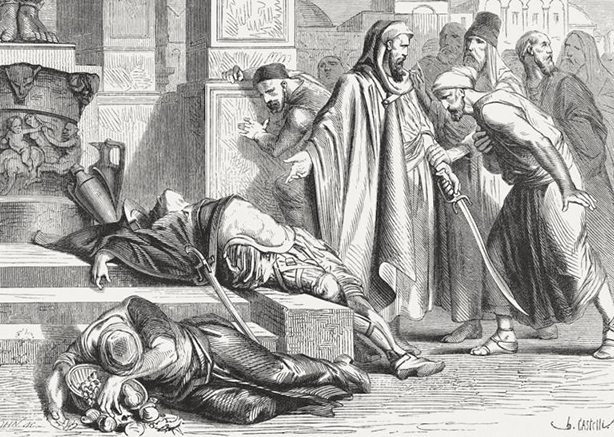By Ady Manory
Assistant Editor
י”א שיש לאכול גבינה בחנוכה לפי שהנס נעשה בחלב שהאכילה יהודית את האויב
“Some say one should eat cheese on Hanukkah, for the miracle that was wrought through Judith who had fed the enemy dairy.” (Shulchan Aruch, Siman 670)
Before I elaborate, a confession: I have not read Judith’s story. Additionally, I recommend you also avoid reading her story. The reason being Rabbi Akiva’s provocative declaration in the tenth chapter of Mishna Sanhedrin, that אף הקורא בספרים החיצונים “those who read apocryphal texts forfeit their portions in the world to come.” There is so much reading material within the traditional biblical canon, have I read those? No. I have not. So why should I read extrabiblical texts? Fortunately for our immortal souls, someone else has read it in the Septuagint, heroically sparing our afterlives the inconvenience of not being had very well. Since “one who saves a single life is counted as though they saved the whole world (Sanhedrin 37a,)” we can reasonably rest assured that the selfless scholars who read the Apocrypha so that we do not have to, still maintain their place in the Talmudic version of paradise. Everything settled? Great. Here is the basic story:
Judith is famous for having seduced and beheaded the Assyrian general Holofernes, who was on his way to conquering her town and its Hebrew inhabitants some time between the third and second century before the Common Era. According to Rabbi Yaakov Chaim Sofer (1870–1939 CE,) Judith “offered the general salted cheese to instigate his thirst.” To sate his thirst she offered him wine. When general Holofernes laid down for an inebriated nap, Judith decapitated him and brought his head home as a trophy. The ancient Judean defense forces seized the moment of confusion in the Assyrian army’s chain of command and dismantled the Assyrian assault. A mighty victory was won for the Judeans over the mediocre Babylonians and their not very good but in some sense great king, Nebuchadnezzar.
So to answer the question of was she great? My answer is “yes;” Judith was a great heroine in the same sense that the Great Shunamite of the book of 2 Kings (Chapter 4,) was great. What was great about both of these ancient Judeans? The biblical author of 2 Kings called her great, so that we the readers would become very curious, and ask: “What is it in particular that is so great about her?” A brilliant conversation will naturally follow among ourselves concerning the nature of the Great, the nature of the Good, and the nature of the Alright, and we all will have emerged as mighty victorious champions of sensible discourse, by virtue of our having conducted such an agreeably stimulating exchange concerning Jewish values and Jewish evaluations.
Philosophical pondering aside — what is the answer? What was the Shunamite’s greatness? When Elisha and Gehazi asked the Shunamite how they might reward her for her generous hospitality, her reply was: “בתוך עמי אנכי ישבת” “I dwell within my nation.” As though saying, “Don’t worry about rewarding me with special favors, ask what the nation — your fellow ancient Judean society—, whom I dwell amongst — what does this nation, these people, our extended family of friends and neighbors, need right now?” Isn’t that a great question?
Additionally to the above, Judith was not satisfied with merely delegating her revealed insights on what needs to be done at the national level, by her fellow Israelites, but rather Judith girded as it were, her own loins for the job. By executing the bold plan herself, she demonstrated admirable leadership. By removing Holofernes’s head from his body, Judith recognized that applying her plan of strategic multiplication with the enemy would require someone with a particular set of skills, skills that made her divisive to people like Holofernes, to paraphrase Bryan Mills, played by Liam Neeson in the 2008 film “Taken.”





